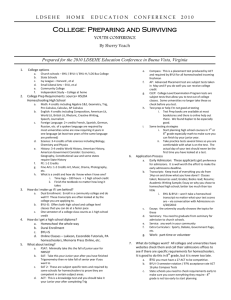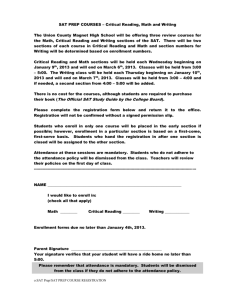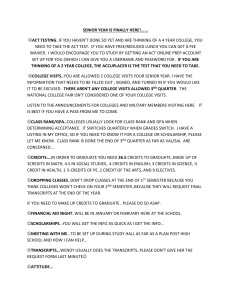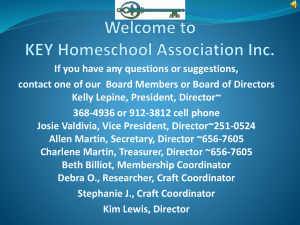College Prep 101
advertisement
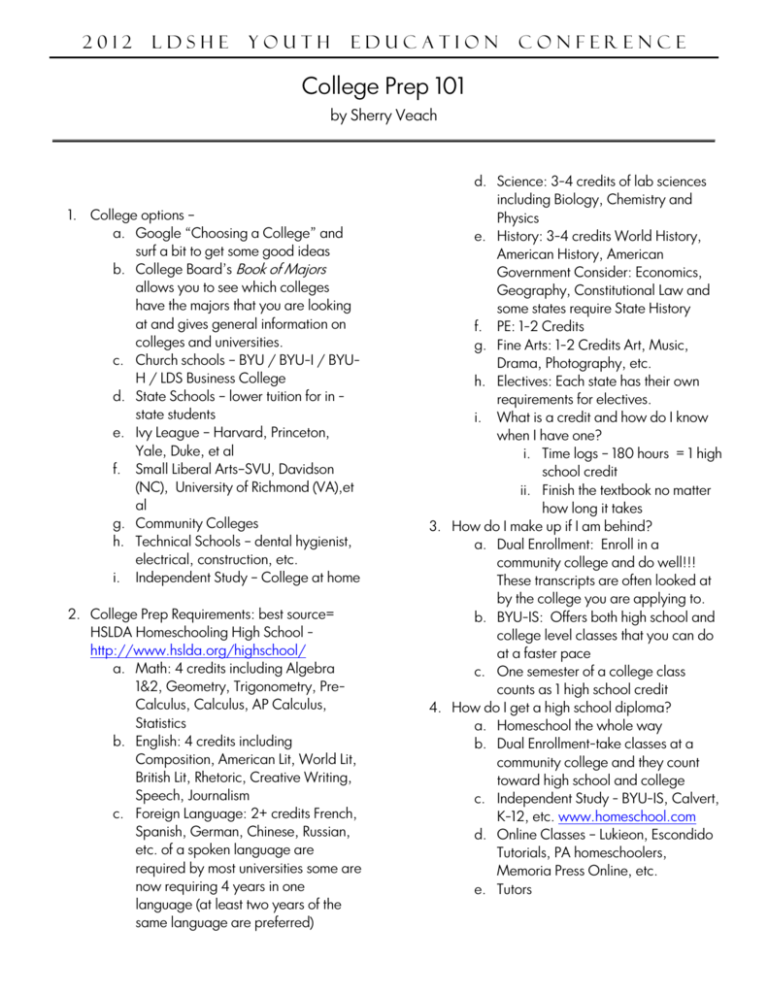
2012 LDSHE YOUTH EDUCATION CONFERENCE College Prep 101 by Sherry Veach ________________________________________________________________________________________ 1. College options – a. Google “Choosing a College” and surf a bit to get some good ideas b. College Board’s Book of Majors allows you to see which colleges have the majors that you are looking at and gives general information on colleges and universities. c. Church schools – BYU / BYU-I / BYUH / LDS Business College d. State Schools – lower tuition for in state students e. Ivy League – Harvard, Princeton, Yale, Duke, et al f. Small Liberal Arts–SVU, Davidson (NC), University of Richmond (VA),et al g. Community Colleges h. Technical Schools – dental hygienist, electrical, construction, etc. i. Independent Study – College at home 2. College Prep Requirements: best source= HSLDA Homeschooling High School http://www.hslda.org/highschool/ a. Math: 4 credits including Algebra 1&2, Geometry, Trigonometry, PreCalculus, Calculus, AP Calculus, Statistics b. English: 4 credits including Composition, American Lit, World Lit, British Lit, Rhetoric, Creative Writing, Speech, Journalism c. Foreign Language: 2+ credits French, Spanish, German, Chinese, Russian, etc. of a spoken language are required by most universities some are now requiring 4 years in one language (at least two years of the same language are preferred) d. Science: 3-4 credits of lab sciences including Biology, Chemistry and Physics e. History: 3-4 credits World History, American History, American Government Consider: Economics, Geography, Constitutional Law and some states require State History f. PE: 1-2 Credits g. Fine Arts: 1-2 Credits Art, Music, Drama, Photography, etc. h. Electives: Each state has their own requirements for electives. i. What is a credit and how do I know when I have one? i. Time logs – 180 hours = 1 high school credit ii. Finish the textbook no matter how long it takes 3. How do I make up if I am behind? a. Dual Enrollment: Enroll in a community college and do well!!! These transcripts are often looked at by the college you are applying to. b. BYU-IS: Offers both high school and college level classes that you can do at a faster pace c. One semester of a college class counts as 1 high school credit 4. How do I get a high school diploma? a. Homeschool the whole way b. Dual Enrollment-take classes at a community college and they count toward high school and college c. Independent Study - BYU-IS, Calvert, K-12, etc. www.homeschool.com d. Online Classes – Lukieon, Escondido Tutorials, PA homeschoolers, Memoria Press Online, etc. e. Tutors 2012 LDSHE Youth Education Conference –College Prep 101-Sherry Veach (cont.) 5. What about testing? http://www.hslda.org/highschool/testing.a sp a. PSAT: Minimally take this the fall of junior year for NMSQT. This is not a Prep for the SAT. It is a totally different test. b. SAT: Take this your Junior year after you have finished Trigonometry then re-take fall of senior year if you want or need to http://www.collegeboard.org/ (this is for PSAT, SAT, SAT2 tests) c. SAT 2: These are subject specific tests and required by some schools for homeschoolers to prove they are competent in certain subject areas. d. ACT: This is a knowledge test and you should take it your Junior year after completing Trig http://www.actstudent.org/ e. Compass: This is a placement test produced by ACT and required by BYUI for all homeschooled incoming freshman http://www.act.org/compass/ f. AP: Advanced Placement test are subject tests taken in May and if you do well you can receive college credit. http://apcentral.collegeboard.com/ apc/public/exam/calendar/index.ht ml g. CLEP: College Level Examination Program tests are subject tests that allow you to test out of college classes. Some universities no longer take these so check with your school before you test. http://clep.collegeboard.org/exam h. Test Prep i. Test Prep books are available at most bookstores and there is good online help out there. We found Kaplan to be especially good. http://www.kaptest.com /College/SAT/index.html i. Some testing strategies i. Start planning high school courses in 7th or 8th grade especially math to make sure you can finish trigonometry by your junior year. ii. Take practice tests several times so you are comfortable with what is on the test. The actual day of your test should never be the first time you have looked at a test. iii. Practice writing 30 minute essays – at least one a month Some good prompts http://professionals.colle geboard.com/testing/sat -reasoning/prep/essayprompts 6. Application Process a. Early Admission: These applicants get preference for admissions. It is well worth the effort to make the early admissions deadline. b. Transcripts/Portfolios: Keep track of everything you do from 12-14yo on up. Classes taken; Resources used; Grades; Books read; Resume; Academic Writing Sample (preferably graded by someone besides your mom); Extracurricular Activities, Essay on why you chose to homeschool high school; better too much than too little c. Essays: the university usually chooses the topics for these d. Seminary: You need to graduate from seminary for admission to church schools. e. Service: any work in your community, scouting, YM/YW f. Extracurricular Activites: Athletics, Work, Debate, Government Page, Clubs, Leadership, Organizations, etc. g. Work: part-time or volunteer 2012 LDSHE Youth Education Conference –College Prep 101-Sherry Veach (cont.) 7. What do Colleges want? All colleges and universities have websites check them and call their admissions offices to see if there are specific requirements for homeschoolers. It is good to do this in 8th grade, but it is never too late. a. BYU you must have a 27 ACT to be competitive. They do not accept homeschooled transcripts or portfolios. i. http://saas.byu.edu/tools/b 4byu/sites/b4/?newfreshman/homeschooledapplicants/ b. BYU-I-3 semester rotation / 97% acceptance rate ACT 16 plus Compass or GED Tests i. http://www2.byui.edu/Admi ssions/students/apply/homes chool.shtml c. State schools you need to check requirements early to make sure you cover everything they require - 8th grade is not too early to start planning i. Most state schools have a homeschool students tab on their admissions page d. SVU and other small liberal arts colleges look at other factors so you will need to check their requirements 8. How am I going to pay for all this? – there are financial tabs on every school website a. Scholarships – How? Where? When? Google websites and don’t pay money b. Get a job in high school and save money c. Student Loans/Grants – apply for these through FAFSA online http://www.fafsa.ed.gov/ 9. What if I don’t go to a church school? a. Institute: The church has Institutes at almost all universities and they are well staffed and give you a great support group at a non-church school http://www.lds.org/institutes 10. Skills you need for college a. Reading: You will likely have more reading to do than you can accomplish. Do you know how to prioritize your reading and are you used to reading for 2 plus hours a day? b. Notetaking: You need to be able to take notes from reading and from lectures. c. Academic Writing: you will write several 6-8pg papers during every semester. Do you know how to write an academic paper using MLA or some other standardized format? Professors will often ask for a one page response paper. This is not a narration, but your “response” to a book. d. Study / Testing: if you do not currently test in your homeschooling you will need some practice in how to study for and take tests. i. Machine scored bubble tests ii. Short answer tests iii. Essay tests e. Time Management: Can you manage multiple tasks on your own or does your mom tell you what to do from task to task? f. Organization: Do you take care of your own belongings and schedule? g. Money Management: Do you manage your own money? Pay your tithing and obligations on your own? Also, you will need to sit down with your parents and discuss what they expect from you – pay all of your college expenses or part or none. Will they expect you to work while in college? etc. h. Health Skills: Eating Right; Sleeping; Exercising; Pacing i. Spiritual Skills: Prayer; Scripture Study, Church Attendance; Institute or Religion Classes 11. Resources a. Websites that are useful – this is only a sampling 2012 LDSHE Youth Education Conference –College Prep 101-Sherry Veach (cont.) i. http://www.collegeboard.co m ii. http://www.hslda.org/highs chool 1. http://www.hslda.or g/highschool/HTHS4 YearPlan.pdf 2. http://www.hslda.or g/docs/nche/00000 0/00000019.asp iii. http://www.besmart.com/ iv. http://www.lukeion.org/ v. http://www.gbt.org/tut.html vi. http://www.aphomeschooler s.com/ vii. http://www.memoriapress.c om/onlineschool/ b. Books that are useful – this is only a sampling i. The Well-Trained Mind Susan Wise Bauer ii. Ultimate Guide to Homeschooling – Debra Bell iii. Home School High School and Beyond – Beverly Gordon iv. Homeschooler’s Guide to Portfolios and Transcripts – Loretta Heuer v. Homeschooling High School – Jeanne Gowen Dennis vi. How to go to College Almost for Free – Ben Kaplan vii. The Scholarship Scouting Report – Ben Kaplan viii. How to Read A Book – Adler and Van Doren ix. The Complete SAT Study Guide – College Board x. The Real ACT – ACT Inc. xi. College Board’s Book of Majors 12. Requirements for BYU-Provo as per conversation with Admissions a. Homeschoolers must have a 27 ACT to be considered b. BYU does not accept transcripts except from an accredited institution like BYU-IS or other accredited program c. Seminary – need to be a 4 year graduate d. They will look at AP/IB exams e. They do not consider concurrent enrollment for admissions – it will count for credit once you are admitted. f. They do not consider independent study for admissions – it will count for credit once you are admitted g. Need Extracurricular; Seminary; Service; Sports; Leadership, etc h. You must have a 32 ACT to be eligible for scholarships i. You do not need a GED j. No writing on the ACT or SAT yet, but it is recommended that you take them in case BYU changes its policies. 13. Requirements for BYU-Idaho a. ACT plus GED or COMPASS or 15 or more semester credits of accredited college/university study b. Required scores – i. ACT – 16-no writing required yet ii. SAT – 760-800-no writing required yet iii. Compass Tests – Reading72; Math 22; Writing - 450 iv. GED – 450 in each subscore and a 500 composite c. College Credit – i. If you have 15-29.9 credits earned you do not have to take the Compass test ii. If you have 30+ credits you apply as a transfer student and no not need an ACT d. BYU-I does not accept transcripts except from an accredited institution like BYU-IS Minimum age requirement is 17. If you are younger you must petition the committee
